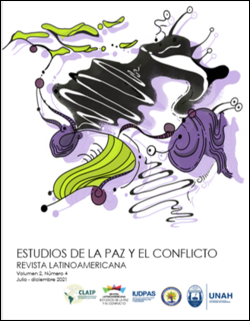Análisis de las políticas de seguridad ciudadana en El Salvador y su impacto en el incremento de la violencia
DOI:
https://doi.org/10.5377/rlpc.v2i4.11373Palabras clave:
Seguridad ciudadana, pandillas, maras, El Salvador, violencia, políticas públicasResumen
Este artículo analiza las políticas de seguridad ciudadana que se han implementado en El
Salvador para combatir a las pandillas. El estudio hace un repaso por los cuatro distintos
gobiernos que de 2003 a 2019 han intentado, sin éxito, reducir los altos niveles de
violencia. El artículo indaga en cómo estas políticas han permitido el fortalecimiento de
las pandillas, el debilitamiento de la institucionalidad y, principalmente, el
recrudecimiento de la violencia expresada en la tasa de homicidios, que ha hecho de El
Salvador uno de los países más violentos del mundo. Por otra parte, también se hace una
breve exposición sobre el futuro de la política de seguridad ciudadana del gobierno de Nayib Bukele, tomando en consideración el contexto actual marcado por la pandemia
COVID-19.
Descargas
7248
HTLM 4372
XLM 4806
EPUB 146
Publicado
Cómo citar
Número
Sección
Licencia
Los contenidos de la revista se publican bajo licencia Creative Commons Reconocimiento 4.0 (CC BY 4.0). Esta licencia permite a terceros compartir (copiar y redistribuir el material en cualquier medio o formato) y adaptar (remezclar, transformar y crear a partir del material para cualquier finalidad, incluso comercial), siempre que se reconozca la autoría y la primera publicación en esta revista (Revista Latinoamericana Estudios de la Paz y el Conflicto, Universidad Nacional Autónoma de Honduras - Consejo Latinoamericano de Investigación para la Paz, DOI de la obra), se proporcione un enlace a la licencia y se indique si se han realizado cambios en ésta. Los términos de la licencia están disponibles online en http://creativecommons.org.




